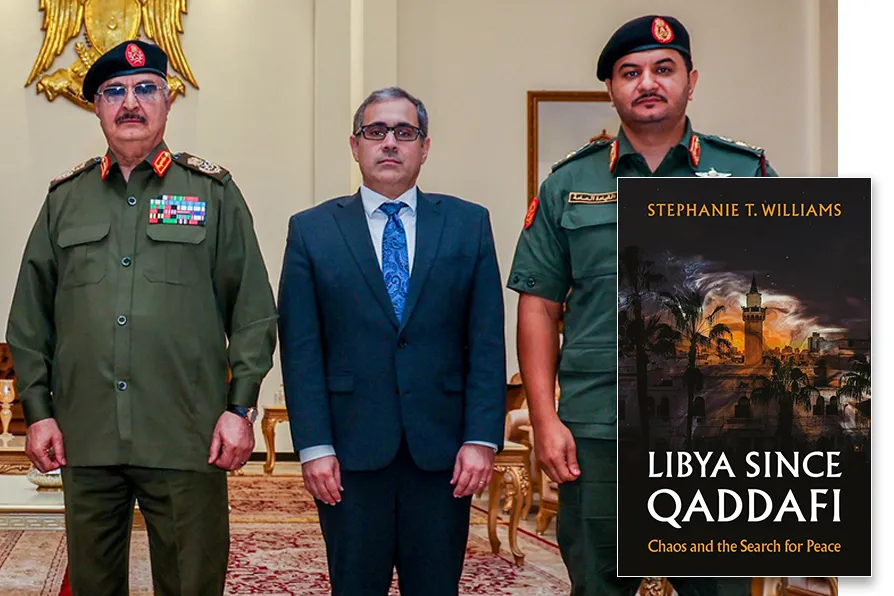RITA DI SANTO draws attention to a new film that features Ken Loach and Jeremy Corbyn, and their personal experience of media misrepresentation
Error message
An error occurred while searching, try again later.BOB NEWLAND doubts the political credentials, but praises the description of the impossible bind of a UN mediator in Libya in the era of Trump

 PIGGY IN THE MIDDLE: Haftar (left) and his son Saddam (right) with United States ambassador to Libya Jeremy Berndt in September 2024 [Pic: US Government/CC]
PIGGY IN THE MIDDLE: Haftar (left) and his son Saddam (right) with United States ambassador to Libya Jeremy Berndt in September 2024 [Pic: US Government/CC]
Libya Since Qaddafi
Stephanie T Williams, Hurst, £45
AS the title suggests, Williams focuses on the period after the Western-inspired regime change which led to the assassination of Muammar Gadaffi and threw Libya into years of turmoil and destruction.
Williams worked for the US State Department until resigning following the election of Donald Trump and taking up the role of mediator with the United Nations.
She does not explore the story of Western intervention or acknowledge the many positive aspects of Libya under Gadaffi. Among these is the taking of its oil into national ownership and using its enormous revenues to provide free healthcare, free education, free housing and family support.
Williams seems satisfied to pass off that fascinating period of Libyan history by simply describing Gadaffi as a dictator exercising control over an “original but harsh experiment in governance.”
Also, although at times deeply critical of US and other Western powers’ approach to regime change, which in Iraq, Libya and Syria brought about chaos and conflict and unleashed Islamist terrorism throughout the region, Williams does not reject the idea of regime change in her description of the Libyan tragedy into which she was cast.
Given these qualifications, Williams provides a detailed and fascinating picture of the impossible position of the UN team on the ground in Libya, struggling to develop a long-term solution for a totally fragmented country. Competing local warlords, tribal leaders and criminals were fighting to gain control of part or all the country.
Islamist terrorist groups, Isis and Al-Qaida, along with the Muslem Brotherhood, were all seeking to intervene with support from regional governments such as Egypt, the UAE and Turkey. All this was compounded by repeated interference by the US, Russia and France.
The ups and downs of the internal negotiating process are brilliantly analysed along with deep insight into which of the wider international considerations impacted the most.
The uncertain global situation in today’s second Trump administration is highlighted by one terrible moment for the UN mediators. Libya was effectively divided in two, with the UN-recognised regime based in Tripoli, and General Khalifa Haftar’s UAE-sponsored regime in the east. The US and most Western powers recognised the Tripoli government. In 2019, at the very moment when agreement seemed to have been reached for a road map towards the creation of a new constitution and elections to establish one national government, Trump switched sides.
Trump telephoned Gen Haftar, who was threatening a military invasion of Tripoli, telling him that if he was going to do it then to get on with it without delay. The White House then issued a statement praising Haftar’s role in “the war on terror and in ‘securing’ Libya’s oil resources.”
The invasion collapsed the agreements that had taken years to build. The US and Russia subsequently blocked attempts at the UN security council to condemn Haftar’s invasion.
The story continues, exploring the efforts by external players to maintain or establish influence over Libya’s affairs. Central to this are Libya’s vast oil reserves and existing or potential military bases for Turkey, Russia and the US. To this are added the natural disasters of Covid and climate change. Throughout their efforts, the UN team battled to find a role in the process for the ordinary people of Libya and, in particular, to establish rights and positions for women in a deeply misogynistic society.
Williams details the emotional and personal strain of trying to deliver this impossible task. In the end, peace was established, but to date no agreement has been reached to establish a new constitution, or elections to unify the country under one legitimate government, and local elections to provide workable administrations to address the many issues facing the Libyan people. Libya remains in the hands of corrupt war criminals intent on maintaining their own power and looting the country.
If you can read through the obvious bias towards Western world views, the book provides a fascinating documentation of the events after Gadaffi’s removal and the battle for the hearts and minds — and the oil — of the Libyan people. It also casts light on the secretive world of UN agencies and the author’s personal experience of abuse, slander, political manoeuvring and even an assassination attempt.










